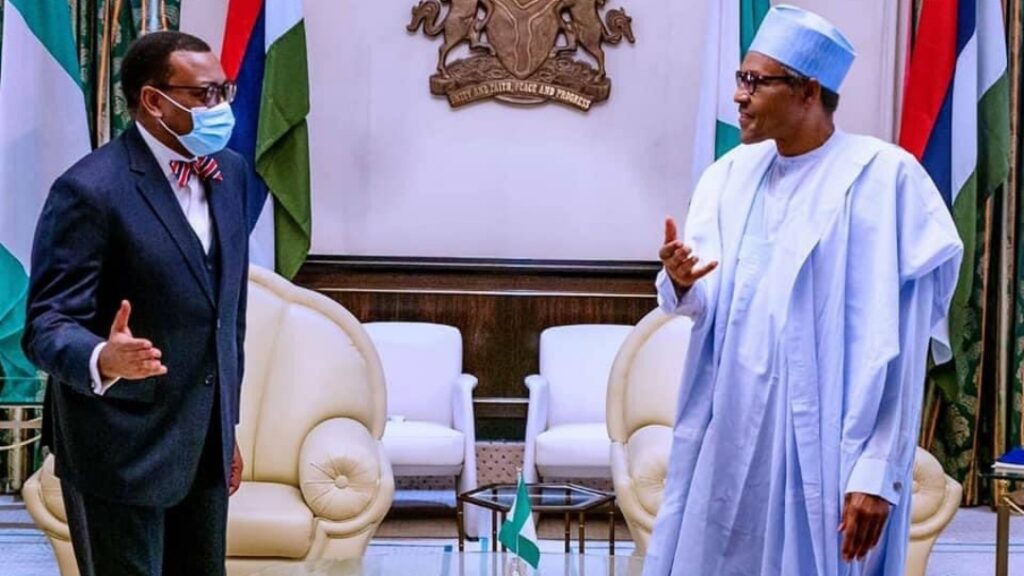

African Development Bank has affirmed that Nigeria has a debt challenge, with debt service gulping 73 per cent of government revenue.
President of the AfDB, Dr Akinwumi Adesina, gave the bank’s position, which is completely different from that President Muhammadu Buhari and Minister of Finance, Budget and National Planning, Zainab Ahmed, who interpret the challenge before the nation as revenue generation.
Adesina spoke on Monday at a mid-term retreat for ministers. President Buhari and Vice President Yemi Osinbajo were among the audience.
In his budget presentation to the National Assembly, Buhari in trying to assuage concerns over rising debt said, “Some have expressed concern over our resort to borrowing to finance our fiscal gaps. They are right to be concerned. However, we believe that the debt level of the Federal Government is still within sustainable limits. Borrowings are to specific strategic projects and can be verified publicly…
“Our target over the medium term is to grow our Revenue-to-GDP ratio from about eight per cent currently to 15 per cent by 2025. At that level of revenues, the Debt-Service-to-Revenue ratio will cease to be worrying. Put simply, we do not have a debt sustainability problem, but a revenue challenge which we are determined to tackle to ensure our debts remain sustainable”.
But arguing from a different perspective, Adesina said Nigeria’s debt service to revenue ratio was high at 73 per cent and urged the government to decisively tackle the challenge.
“Nigeria must decisively tackle its debt challenges. The issue is not about debt-to-GDP ratio, as Nigeria’s debt-to-GDP ratio at 35 per cent is still moderate. The big issue is how to service the debt and what that means for resources for domestic investments needed to spur faster economic growth.
“The debt service to revenue ratio of Nigeria is high at 73 per cent. Things will improve as oil prices recover, but the situation has revealed the vulnerability of Nigeria’s economy. To have economic resurgence, we need to fix the structure of the economy and address some fundamentals.
“Nigeria’s challenge is revenue concentration, as the oil sector accounts for 75.4 % of export revenue and 50 % of all government revenue.”
As of June 30, 2021, the country’s external obligations stood at $33.468 billion, according to the Debt Management Office (DMO).Domestic debt was $53.2 billion. In naira terms total national debt was N35.5 trillion.
Akinwumi further stated that what was needed for sustained growth and economic resurgence is to remove the structural bottlenecks that limit the productivity and the revenue earning potential of the huge non-oil sectors.
“Nigeria should significantly boost productivity and revenues from its non-oil sector, with appropriate fiscal and macroeconomic policies, especially flexible exchange rates that will enhance international competitiveness.”
The AfDB President further said Africa should be producing and not begging for vaccines.
According to him, the African Development Bank will invest $3 billion in support of local pharmaceutical industries in Africa, including in Nigeria.
“Nigeria must build quality health care systems that will protect its population, today and well into the future.
“Nigeria must also build world-class local pharmaceutical industries, able to effectively tackle the production of therapeutic drugs and vaccines.
“Nigeria must revamp its local pharmaceutical industry and launch strategic investments for local vaccine manufacturing. Africa should not be begging for vaccines; Africa should be producing vaccines.
Adesina also further stated the government should not be decongesting the ports in Nigeria, rather “we should be transforming the ports.
“This must start with cleaning up administrative bottlenecks, most of which are unnecessary with multiple government agencies at the ports, high transaction costs or even plain extortions from illegal taxes, which do not go into the coffers of the government.
“Nigeria should rapidly modernise and transform its ports. Ports are not there for revenue generation. They are for facilitating business and exports, and stimulating industrial manufacturing, and competitiveness of local businesses and exports,” Adesina said.
Man stabs friend over woman in FCT council A 27-year -old man, Rabiu Suleiman, has reportedly…
South African court acquits Nigerian pastor of rape after 8 years in jail A High Court in the…
Man jailed 3 months for non-declaration of $30,000 at airport Justice Deinde I. Dipeolu of the Federal High…
More heads to roll in NNPCL, subsidiaries as Ojulari assumes office There are indications that more…
Trump slams Nigeria with high tariff in shocking trade crackdown President Donald Trump has ignited a…
Barcelona beat Atletico to set up cup final against Real Madrid Barcelona narrowly edged past…